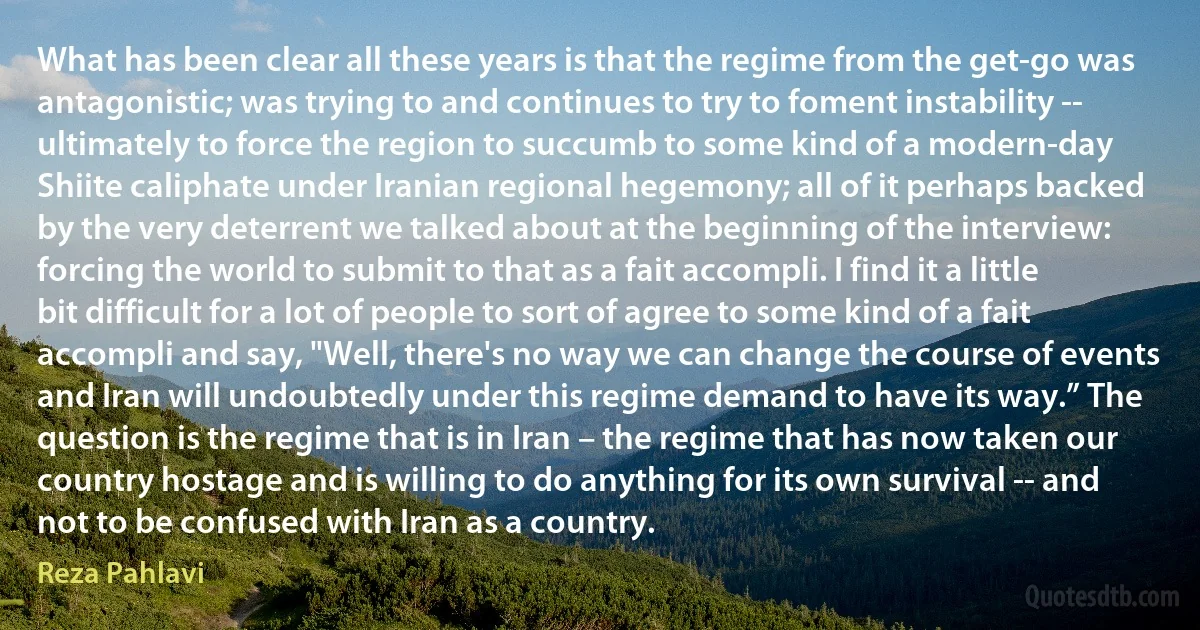
What has been clear all these years is that the regime from the get-go was antagonistic; was trying to and continues to try to foment instability -- ultimately to force the region to succumb to some kind of a modern-day Shiite caliphate under Iranian regional hegemony; all of it perhaps backed by the very deterrent we talked about at the beginning of the interview: forcing the world to submit to that as a fait accompli. I find it a little bit difficult for a lot of people to sort of agree to some kind of a fait accompli and say, "Well, there's no way we can change the course of events and Iran will undoubtedly under this regime demand to have its way.” The question is the regime that is in Iran – the regime that has now taken our country hostage and is willing to do anything for its own survival -- and not to be confused with Iran as a country.
Reza PahlaviRelated topics
anything beginning bit caliphate change clear country course find foment force hegemony hostage instability interview iran iranian kind now people perhaps question regime region regional say shiite sort take trying try under way well willing world years get-goRelated quotes
One, a caliphate is a global government, and you know that's where we're headed. Everybody is headed now towards a global government. Well, so are the Islamic extremists, except theirs is Sharia law and infidels will be beheaded. The Shiite Muslims, the ones in Iran, believe in - and not all of them, not the people necessarily on the street - but the real radicals, the revolutionaries and the people at the very top are called Twelvers. They believe in the Twelfth Imam. And that will - that Twelfth Imam, when he returns, he will set up a global caliphate in ancient Babylon. This one should gravely concern you because he has all of the earmarks - in their own writings - of an antichrist, or the Antichrist. I don't know if he is or not. But there are those who will just claim, you know, he's the Twelfth Imam, et cetera et cetera. And the way to get there is global chaos.

Glenn Beck
Colours no longer looked as brilliant to me as they use to do [Monet's sight was beginning to fail], I no longer painted shades of light so correctly. Reds looked muddy to me, pinks insipid, and the intermediate or lower notes in the colour scale escaped me. As for forms, I could see them as clear as ever, and render them as decisively. At first I tried pertinacity. How many times I have remained for hours near the little bridge, exactly were we are now, in the full glare of the sun, sitting on my camp-stool, under my sunshade, forcing myself to resume my interrupted task and to recapture the freshness my palette had lost! A waste of effort. What I painted was more and more mellow.... and (when) I compared it with what I used to do in the old days. I would fall into a frantic rage, and I slashed all my pictures with my penknife.

Claude Monet
Some scoffers have asked, "Where are the pre-Flood civilizations? If there was an entire civilization that was destroyed in the Flood of Noah, why don't we find their cities, highways or machines as we dig in the earth?” That's a fair question, but it is based on a false premise. What type of stuff would they need in a perfect world? If the weather was perfect and the animals were friendly and food was abundant and free and everyone was vegetarian, what would they need? They wouldn't need houses to be protected from weather, climate, or animals. I don't see why they would need buildings of any kind! If the earth was producing enormous quantities of food from pole to pole, they wouldn't need tractors, plows nor a highway system, nor vehicles to move food and goods from one region to another. They wouldn't need lots of things we need for survival and protection today.

Kent Hovind
It should be clear by now that there are people who can, in fact, be reasonably considered experts; that it is rational to rely, within limits, on ex pert opinion; and that it is possible, by exercising relatively simple criteria, to gain insight into whether a particular expert is reliable or not. It is also true that experts, of course, do make mistakes, and that even the agreement of a large majority of experts in a field does not guarantee that they got it right. That's the nature of scientific truth, as we have seen throughout this book: it is tentative, because it is the result of a human endeavor that is limited both by the type and amount of available evidence and by humans' finite mental powers and emotional reactions. But the examples above show how you can, with a little bit of practice, tell science from bunk!

Massimo Pigliucci
Ancient scriptures tell us that man is more than the physical body. In fact, we have two bodies: the physical and the astral, or subtle. But we are the soul! According to the ancient Vedic scriptures of India, the size of the soul is 1/10,000 the tip of a strand of hair. It is located in the heart region and is the actual life force. The physical, as well as the astral or subtle body, acts as a covering or costume that the soul wears in its journey throughout the material sphere. As we pass from costume to costume or from body to body through the process known as reincarnation, the impressions of previous lives imprint themselves on the subtle body and are carried with us during each lifetime. In the dream state, activity in the subtle body becomes more dominant than activity in the physical body. Our dream experiences are often impressions accumulated from many lifetimes.

Bhakti Tirtha Swami
